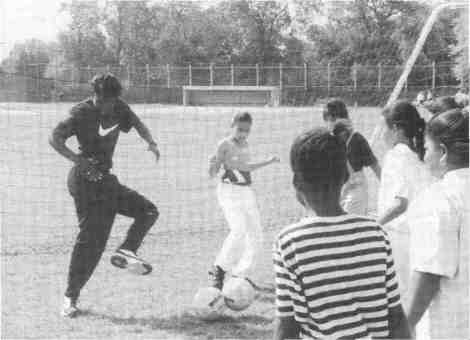Innovations
Sex equity rules:
Proposed commission would look for ways to get more girls into sports
Photo courtesy of Chicago Park District This group of girls is getting a soccer lesson from Briana Scurry, starting goalkeeper for the U.S. Women's National Soccer Team. That team placed third in the 1995 Women's World Championship in Sweden. Scurry was the guest speaker for a day-long conference at Northeastern Illinois University in Chicago that focused on the benefits of girls' participation in sports and other physical activities. A group of Illinois lawmakers wants to strengthen Illinois' sex equity law. State Rep. Judy Biggert, a Hinsdale Republican, says the group wants to create a commission to examine opportunities for girls and boys in sports programs. Research suggests that girls who are active in sports are less likely to get involved with drugs, less likely to get pregnant and more likely to graduate from high school than those who don't participate in sports. But research also shows that, despite the proven benefits to girls involved in physical activities, there has been an erosion of support in schools for sports and physical activity programs for girls. "Whether in school or in their communities, sports and fitness programs for girls are critical to the long-term health of young women," says Biggert. Illinois lawmakers point to successes in Colorado, Minnesota and Florida, which are the only other states that have sports equity commissions. In Colorado, for example, once surveys of girls' participation in sports showed that many districts were not in compliance with the federal sex equity law, there was a local volunteer effort to provide sports programs for girls. The movement in Illinois coincides with a national campaign, sponsored in part by Nike, to get girls involved in sports. Increasing awareness The new Illinois commission would be charged with researching the problems facing girls in sports programs. And supporters want the commission to heighten public awareness of girls' involvement in sports as more than an equity issue. The commission could make recommendations that give schools and communities a "game plan" to ensure equal opportunities for girls and boys. State Rep. Judy Erwin, a Chicago Democrat, joined Biggert in calling for the commission. "Women and girls are still struggling for equitable opportunities in sports as athletes, officials, coaches and administrators," says Erwin. "Illinois is the only state in the country that mandates physical education in its public schools and should assume a leadership role in providing equitable opportunities." Sponsors hope the legislature will create the new sports equity commission in the spring session. Beverley Scobell Women's sports facts •Nearly a third of high school freshman girls participate in sports. That number drops to 17.3 percent by senior year. •Boys still outnumber girls on the high school playing fields by two to one. •Ninety-four percent of local television news sports coverage goes to men's sports. Women's sports gets 5 percent and gender neutral topics 1 percent. •Increased physical activity results in increased self-esteem for preadolescents. •Women who were active in sports and recreational activities as girls feel greater confidence, self- esteem and pride in their physical and social selves than those who were sedentary as kids. Facts compiled by Women's Issues Network Foundation and A Sporting Chance Foundation, Chicago. 4/ December 1995/ Illinois Issues
|
|||||||||||||||
